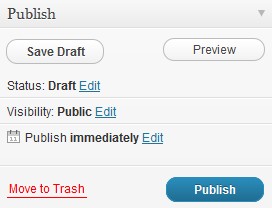Last week, I shared tips on writing for the web, or, as I affectionately referred to all of us online readers, writing for online monkey minds. Reading on the web is a different experience than reading the printed page. Online reading is informal, interactive and interruptive; it requires a different style of writing. In my monkey mind post I discussed writing for scanners, not readers, and the importance of headlines and formatting.
No matter the medium, you want to hook the reader and get to the point quickly. On the web, it’s even more critical because we feel less loyalty to a web page than we do to a magazine or book we’ve purchased, so we’re apt to click away as soon as you bore us.
Imagine talking to your reader.
The web feels different than a magazine, newspaper or book. We talk back on the web, get replies and have conversations. When you write for the web, use a more conversational voice than you would for the printed page. It’s okay to write in the first person, whereas that would not usually fly in a printed article.
Pay attention to your voice. Using “you” is fine. When I write blog posts, I imagine I’m giving advice, sharing ideas or having a conversation with a friend or colleague. I use “you” throughout my posts because I’m talking to you. I can’t see you, but I imagine you there, listening. This is perfectly healthy.
For organizations, especially in blog posts, don’t always refer to yourself as “we.” It may be appropriate at times, but “we” can sound awfully impersonal. Some readers may even hear it as a royal “we” if they’re in an unforgiving mood. As a reader, I want to connect with a person, the writer, not to a faceless institution represented by “we.” It’s far too anonymous and nontransparent.
However, I use “we” frequently when I write about topics that concern my community, for example, when I write for the association community about a membership issue. That’s an inclusive “we” in the sense that “we’re all in this together.”
Oh, you think you’re funny?
We might be funny to a few people, maybe. If we’re lucky, a dozen or so might get a chuckle from our brand of humor. Humor works online because it’s informal and conversational. A little humor entertains us and keeps us reading. But if you want to get a point across, don’t go overboard with humor unless you’re a comic genius with a humor blog.
Sarcasm, however, doesn’t always translate. I find sarcasm hard to resist because it’s part of my usual schtick. But in real life we use inflection, stress, timing and facial expressions to make our zingers stick. Online, we only have this: 😉 Tread carefully so you don’t unwittingly insult your readers.
I’ve seen writers convey sarcasm by stretching out a word with extra vowels so it reads how it would sound in a sarcastic tone. Others will add a “heh” to their sarcastic remarks, or use sentence fragments to instill the same sense of timing they’d use in real life.
You’re not done yet!
When I’m done with a piece, I use the Find tool to look for instances of passive voice. Passive voice will suck the life out of your writing. I search for the following words (and suffix) and change them where I can: be, was, is, were, are, -ing.
Keep tightening it up. Look for redundancies and unnecessary words and phrases, like “that” or “some.” Does your word order make sense?
When in doubt, look it up. Keep dictionary.com in your bookmark bar so you don’t use the wrong word by mistake. Find grammar resources to help you with those pesky little rules you tend to forget. Don’t worry, this happens to everyone; we forget because our brains are too full.
Here are a few to check out:
- Grammar Girl
- Daily Grammar Lessons
- A selection of grammar resources from Writing Forward
Finally, read it out loud. Or at a whisper. How does it sound? Any awkward spots? Jargon? Corporate-speak? Are you bored? You’ll be amazed how well this technique works.
I heard someone say recently on a Twitter chat: “Perfection is the enemy of good.” So true. There’s always something to edit in that final draft. But summon your strength and make it the final final. Click Publish and move on unless you’re chasing a Pulitzer.

Next time I’ll get into comments, trolls, copyright, fair use and all that good stuff.
Writing for the Web series

Thanks for sharing the Writing Forward article! Every writer needs solid resources 🙂
LikeLike
You’re welcome, Melissa! I’m glad I found it.
LikeLike